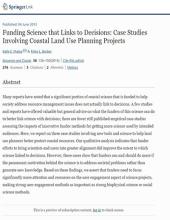
Abstract
Many reports have noted that a significant portion of coastal science that is funded to help society address resource management issues does not actually link to decisions. A few studies and reports have offered valuable but general advice on what the funders of this science can do to better link science with decisions; there are fewer still published empirical case studies assessing the impacts of innovative funder methods for getting more science used by intended audiences. Here, we report on three case studies involving new tools and science to help land use planners better protect coastal resources. Our qualitative analysis indicates that funder efforts to bring scientists and users into greater alignment did improve the extent to which science linked to decisions. However, these cases show that funders can and should do more if the paramount motivation behind the science is to address societal problems rather than generate new knowledge. Based on these findings, we assert that funders need to focus significantly more attention and resources on the user engagement aspect of science projects, making strong user engagement methods as important as strong biophysical science or social science methods.
About this article
This article, published in Estuaries and Coasts in 2013, describes three case studies involving new tools and science to help land use planners better protect coastal resources.
Matso, K. E., & Becker, M. L. (2013). Funding science that links to decisions: Case studies involving coastal land use planning projects. Estuaries and Coasts, 38, 1-15. https://doi.org/10.1007/